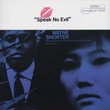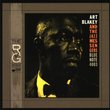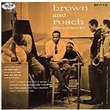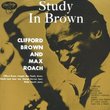| All Artists: Clifford Brown, Max Roach Title: Clifford Brown & Max Roach Members Wishing: 5 Total Copies: 0 Label: Polygram Records Release Date: 10/25/1990 Genres: Jazz, Pop Styles: Modern Postbebop, Bebop Number of Discs: 1 SwapaCD Credits: 1 UPC: 042281464522 |
Search - Clifford Brown, Max Roach :: Clifford Brown & Max Roach
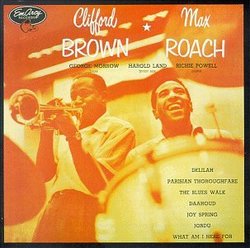 | Clifford Brown, Max Roach Clifford Brown & Max Roach Genres: Jazz, Pop
In his brief career, Clifford Brown provided a new model for trumpeters, combining crisp articulation, fluent lines, and a beautifully brassy sound. When this material was recorded in 1954, Brown had only recently formed t... more » |
Larger Image |
CD DetailsSynopsis
Amazon.com In his brief career, Clifford Brown provided a new model for trumpeters, combining crisp articulation, fluent lines, and a beautifully brassy sound. When this material was recorded in 1954, Brown had only recently formed the quintet with drummer Max Roach, but the strengths that would make it a preeminent group were already apparent. Both Brown and Roach delighted in an incendiary precision, fast tempos on complex material played with joyous ease, and tight rhythmic definition. Brown's inspired invention is apparent everywhere, from the pensive Ellington ballad "What Am I Here For?" to Bud Powell's sleek "Parisian Thoroughfare," while the more relaxed, boppish tenor of Harold Land is a fine complement. Among Brown's tunes for the sessions, "Daahoud" and "Joy Spring" would become frequently played anthems of the hard-bop movement. --Stuart Broomer Similar CDs
|
CD ReviewsBebop At It's Finest!!! J. Rich | 10/11/2007 (5 out of 5 stars) "I'm not going to talk to much about this album other than, if you're a jazz fan, then you need this album. If you ever want to know where Freddie Hubbard and Lee Morgan got their inspiration, then look no further than this album. That's all I've got to say about this album! Highly recommended for the jazz fan." Awesome drum solos in a great cd Neil B. Donavan | LAGUNA BEACH, CA | 09/24/2007 (5 out of 5 stars) "IF YOU ARE A DRUMMER, THIS CD REVEALS THE EARLY MASTERY OF THE DRUMKIT BY MAX ROACH. THE SOLOS ARE INVENTIVE AN MELODIC, NO SOUNDS OF FALLING DOWN THE STAIRS HERE AT ALL." Nothing to add.... D. Alder | Michigan | 09/29/2007 (5 out of 5 stars) "The best of the best is on this cd. A true classis in this genre of jazz......Listen and see how it is supposed to be done!!!"
|

 Track Listings (11) - Disc #1
Track Listings (11) - Disc #1